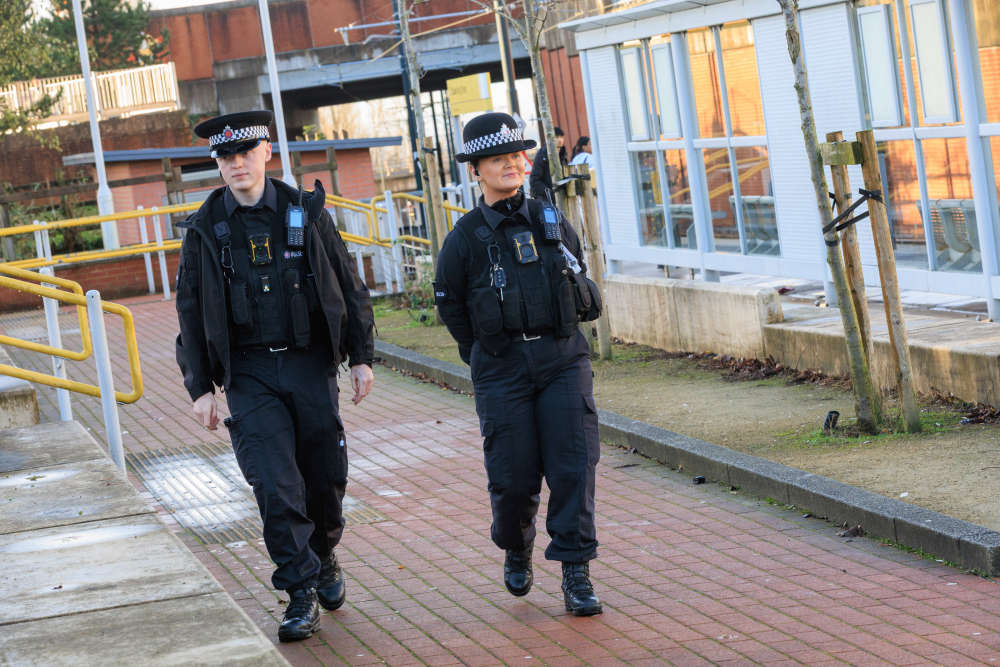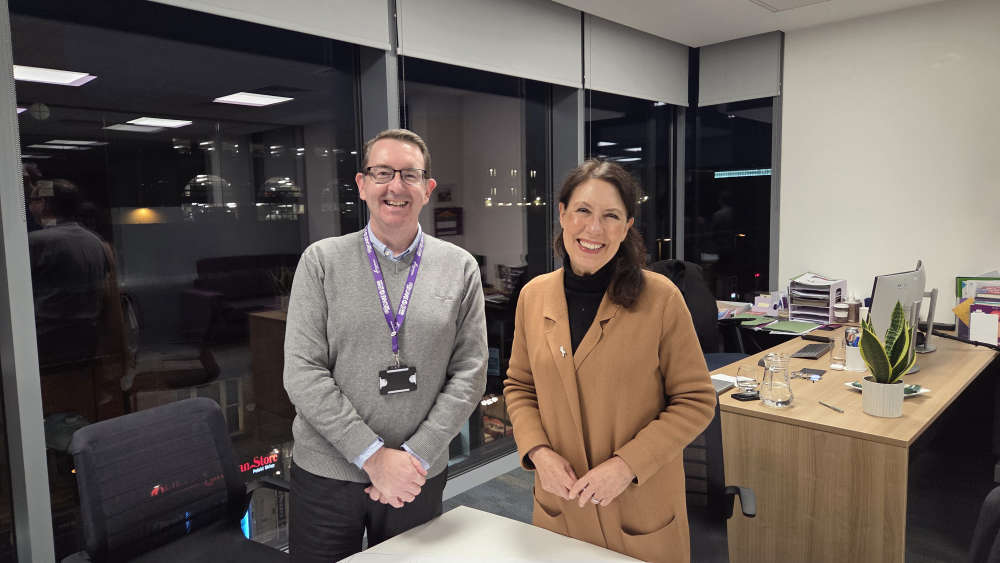
The National Crime Agency (NCA) has released its annual assessment of serious and organised crime, with a stark warning that taking drugs has never been more dangerous.
The threat from drugs to the UK has increased due to a rise in the production of cocaine, an expanding synthetic drugs market, an increase in the availability of synthetic opioids, and more cannabis being imported.
There has been a significant escalation in the criminal use of nitazenes as a cheap way to increase the strength of certain drugs, particularly heroin.
In many cases, users simply do not know what they are consuming, and at least 284 deaths have been linked to high-strength nitazenes since June 2023.
Investigations are currently being made into the death of a young man from Hyde who may have lost his life due to using nitazenes
Twenty-one-year-old Harry Durose was found dead at his supported accommodation in Hyde, Tameside, on March 3.
Drugs containing nitazenes were also discovered inside the address.
If investigations prove Harry had been taking the drug, he will be Greater Manchester’s first nitazene casualty.
His mother, Amy, believes her son bought the drug on the black market, believing it to be the anxiolytic drug diazepam.
He had been diagnosed diazepam for a chronic condition called hypermobility – a condition in which joints are abnormally flexible, causing pain and stiffness – which he had suffered from throughout his life.
“It was terrible,” said Ms Durose. “It really hindered his life, he was in such pain. They prescribed him diazepam which helped him calm down and helped him sleep.”
She says he told friends he had bought diazepam online after being unable to obtain it on prescription.
Ms Durose fears the pills her son received could have been cut with the deadly synthetic drug.
Harry, who had autism and was a keen gamer who had studied computer science at college, had only moved out of the family home in Denton weeks before his death.
Ms Durose said: “He was such a lovely, caring boy.”
A spokesperson for Greater Manchester Police said: “At this time, we are awaiting full post mortem results and therefore are not in a position to confirm the cause of death.”
Following Harry’s death, an industrial unit in Birmingham was raided and 10 kg of suspected drugs was seized.
The number of people dying in the UK from drug misuse is now among the highest in Europe, having more than tripled over the last 30 years.
Illegal drugs are also a key driver of serious and organised crime that blights communities across the UK, putting people in harm’s way, and at risk of violence on the streets from the criminal gangs involved.
The NCA helped seize more than 200 tonnes of class A drugs last year from across the globe, with an estimated street value of almost £17 billion had it reached the UK streets.
And with every kilo taken out that was destined for the UK, the Agency prevents up to 1,000 street deals of cocaine or up to 10,000 deals of heroin.
The National Crime Agency’s National Strategic Assessment (NSA), which draws on intelligence from across law enforcement, government, the third sector and private industry, highlights that while overall crime has fallen in the UK over the last decade, the scale and harm of serious and organised crime has increased. Latest data pinpoints increases in the threat from child sexual abuse, cybercrime and money laundering, as well as drugs.
It also identifies that people in the UK are more vulnerable to serious and organised crime than ever before, as our use of technology continues to grow and criminals across the world exploit this. More than half of all crime (55 per cent) is now online and approximately 90 per cent is digitally enabled.
And children sadly continue to be exploited at scale, with criminals and those with a sexual interest in them seeking to target them via online platforms.
Cyber and fraud offences together now make up over half of all offences reported in the UK. Fraud on its own is the most prevalent crime against individuals in England and Wales, and in 2023, there where double the number of identified incidents of ransomware impacting UK victims compared to 2022.
Firearms crime and associated deaths have declined, down to 25 in 2023, which is close to an all-time low. Discharges overall have reduced since 2022, with 21 per cent fewer in 2023 (463 down from 583).
NCA Director General, Graeme Biggar said: “While overall crime figures have fallen over the last decade, the scale and harm of serious and organised crime has increased. As we outline in our latest assessment, it is clear that serious and organised crime still causes more harm, to more people, more often, than any other national security threat. No part of our society is immune to its effects.
“The National Strategic Assessment helps us to understand the threat that serious and organised crime poses to communities across the UK, to target our efforts and guide others across law enforcement to protect them.
“The NCA is focused on targeting the most harmful organised crime groups, working across the UK, overseas and online to protect the UK public. Last year, in which the Agency marked its milestone ten year anniversary, we arrested a record 1,000 suspected criminals.
“As we have seen criminals taking advantage of technology to commit crime at an ever increasing pace and scale, affecting people and businesses across the UK, we have turned the tables to target them using the technology they rely on. We significantly disrupted LockBit, the longest running ransomware-as-a-service group who were responsible for the largest proportion of ransomware attacks over recent years. And shut down Russian Coms, a platform used by criminals to defraud victims across the world.
“We work with social media companies to take down online adverts set up by people smugglers to entice people to make the hazardous journey across the channel, and we have jailed people who thought they could hide on the dark web to facilitate the sexual abuse of children.
“And we are more committed than ever to targeting the organised criminals and gangs responsible for putting people in small boats to cross the channel, having seized more than 400 boats and engines over the last year.
“But we cannot tackle the threats from serious and organised crime alone. It’s never been as important to work with our partners and use our networks to tackle the threats globally and locally, to ensure the public understand how serious and organised crime can affect their daily lives and how they can keep themselves safe.”
The National Crime Agency (NCA) has released its annual assessment of serious and organised crime, with a stark warning that taking drugs has never been more dangerous.
The threat from drugs to the UK has increased due to a rise in the production of cocaine, an expanding synthetic drugs market, an increase in the availability of synthetic opioids, and more cannabis being imported.
There has been a significant escalation in the criminal use of nitazenes as a cheap way to increase the strength of certain drugs, particularly heroin.
In many cases, users simply do not know what they are consuming, and at least 284 deaths have been linked to high-strength nitazenes since June 2023.
Investigations are currently being made into the death of a young man from Hyde who may have lost his life due to using nitazenes
Twenty-one-year-old Harry Durose was found dead at his supported accommodation in Hyde, Tameside, on March 3.
Drugs containing nitazenes were also discovered inside the address.
If investigations prove Harry had been taking the drug, he will be Greater Manchester’s first nitazene casualty.
His mother, Amy, believes her son bought the drug on the black market, believing it to be the anxiolytic drug diazepam.
He had been diagnosed diazepam for a chronic condition called hypermobility – a condition in which joints are abnormally flexible, causing pain and stiffness – which he had suffered from throughout his life.
“It was terrible,” said Ms Durose. “It really hindered his life, he was in such pain. They prescribed him diazepam which helped him calm down and helped him sleep.”
She says he told friends he had bought diazepam online after being unable to obtain it on prescription.
Ms Durose fears the pills her son received could have been cut with the deadly synthetic drug.
Harry, who had autism and was a keen gamer who had studied computer science at college, had only moved out of the family home in Denton weeks before his death.
Ms Durose said: “He was such a lovely, caring boy.”
A spokesperson for Greater Manchester Police said: “At this time, we are awaiting full post mortem results and therefore are not in a position to confirm the cause of death.”
Following Harry’s death, an industrial unit in Birmingham was raided and 10 kg of suspected drugs was seized.
The number of people dying in the UK from drug misuse is now among the highest in Europe, having more than tripled over the last 30 years.
Illegal drugs are also a key driver of serious and organised crime that blights communities across the UK, putting people in harm’s way, and at risk of violence on the streets from the criminal gangs involved.
The NCA helped seize more than 200 tonnes of class A drugs last year from across the globe, with an estimated street value of almost £17 billion had it reached the UK streets.
And with every kilo taken out that was destined for the UK, the Agency prevents up to 1,000 street deals of cocaine or up to 10,000 deals of heroin.
The National Crime Agency’s National Strategic Assessment (NSA), which draws on intelligence from across law enforcement, government, the third sector and private industry, highlights that while overall crime has fallen in the UK over the last decade, the scale and harm of serious and organised crime has increased. Latest data pinpoints increases in the threat from child sexual abuse, cybercrime and money laundering, as well as drugs.
It also identifies that people in the UK are more vulnerable to serious and organised crime than ever before, as our use of technology continues to grow and criminals across the world exploit this. More than half of all crime (55 per cent) is now online and approximately 90 per cent is digitally enabled.
And children sadly continue to be exploited at scale, with criminals and those with a sexual interest in them seeking to target them via online platforms.
Cyber and fraud offences together now make up over half of all offences reported in the UK. Fraud on its own is the most prevalent crime against individuals in England and Wales, and in 2023, there where double the number of identified incidents of ransomware impacting UK victims compared to 2022.
Firearms crime and associated deaths have declined, down to 25 in 2023, which is close to an all-time low. Discharges overall have reduced since 2022, with 21 per cent fewer in 2023 (463 down from 583).
NCA Director General, Graeme Biggar said: “While overall crime figures have fallen over the last decade, the scale and harm of serious and organised crime has increased. As we outline in our latest assessment, it is clear that serious and organised crime still causes more harm, to more people, more often, than any other national security threat. No part of our society is immune to its effects.
“The National Strategic Assessment helps us to understand the threat that serious and organised crime poses to communities across the UK, to target our efforts and guide others across law enforcement to protect them.
“The NCA is focused on targeting the most harmful organised crime groups, working across the UK, overseas and online to protect the UK public. Last year, in which the Agency marked its milestone ten year anniversary, we arrested a record 1,000 suspected criminals.
“As we have seen criminals taking advantage of technology to commit crime at an ever increasing pace and scale, affecting people and businesses across the UK, we have turned the tables to target them using the technology they rely on. We significantly disrupted LockBit, the longest running ransomware-as-a-service group who were responsible for the largest proportion of ransomware attacks over recent years. And shut down Russian Coms, a platform used by criminals to defraud victims across the world.
“We work with social media companies to take down online adverts set up by people smugglers to entice people to make the hazardous journey across the channel, and we have jailed people who thought they could hide on the dark web to facilitate the sexual abuse of children.
“And we are more committed than ever to targeting the organised criminals and gangs responsible for putting people in small boats to cross the channel, having seized more than 400 boats and engines over the last year.
“But we cannot tackle the threats from serious and organised crime alone. It’s never been as important to work with our partners and use our networks to tackle the threats globally and locally, to ensure the public understand how serious and organised crime can affect their daily lives and how they can keep themselves safe.”


 Two more arrested after town centre disorder
Two more arrested after town centre disorder
 Poundland Closure in Oldham
Poundland Closure in Oldham
 League Two Preview: Crawley Town v Latics
League Two Preview: Crawley Town v Latics
 MP Debbie Abrahams briefed on FCHOs big project
MP Debbie Abrahams briefed on FCHOs big project


